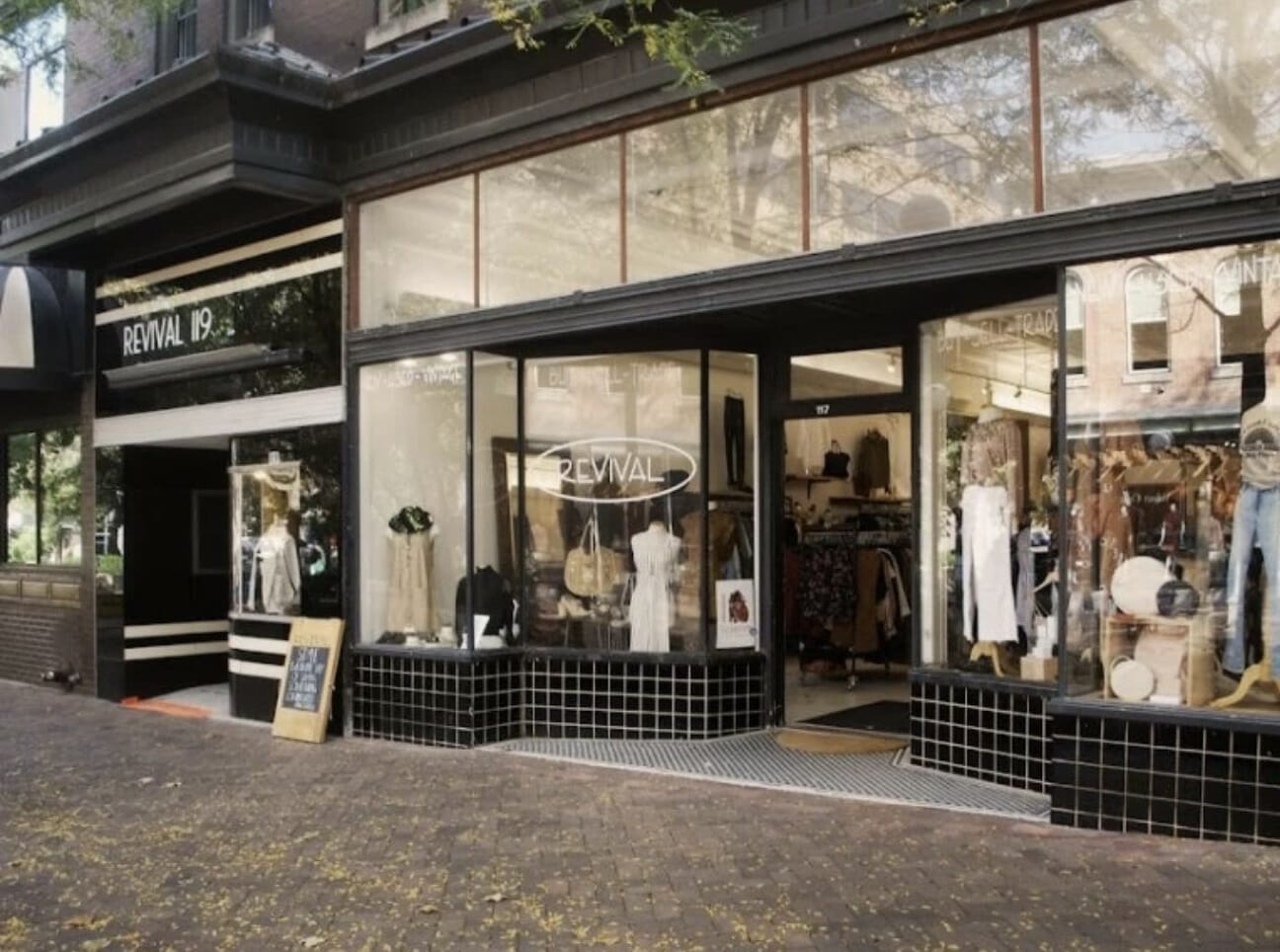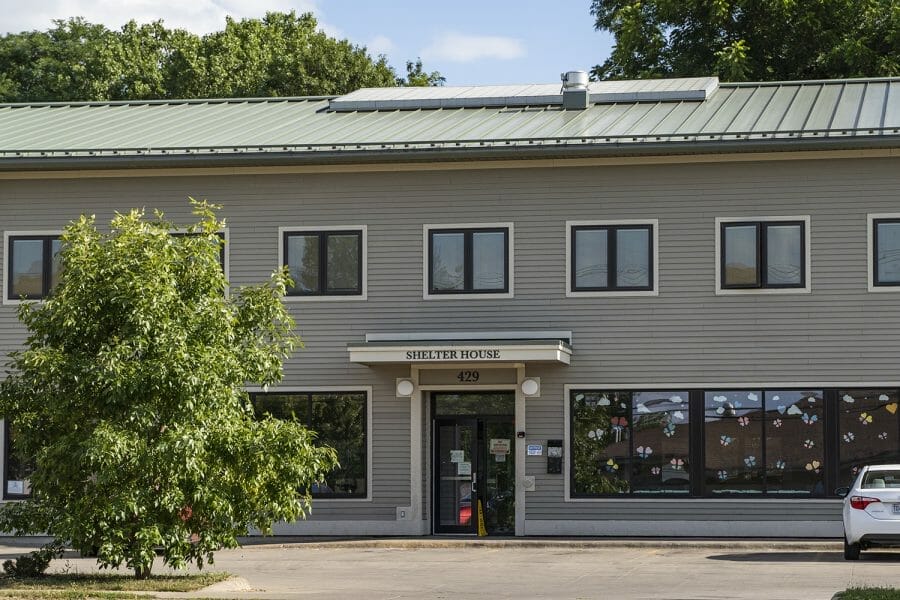
Going Local to Go National
Have you ever stopped to think about what really happens to your unwanted clothes and shoes when you drop them off at your nearest secondhand store? Obviously, you are donating them to be resold at the store, but what about the stuff that won’t sell at the store? What’s really happening to those items?
To answer these questions, I, Emma Morgan, writer at Eco-Stylist, decided to ask some local organizations in Iowa City, Iowa about their resale and recycling programs. What happens locally in Iowa City can serve as a preview and a microcosm of what’s happening nationally.
Iowa City is fortunate to have plenty of great donation and consignment options. The City of Iowa City and Iowa City Landfill and Recycling Center have created an interactive map of secondhand and consignment shops in Iowa City.
How Secondhand and Consignment Stores Handle Donations and Waste
Let’s take a closer look at the recycling programs of a few local secondhand and consignment stores.
Revival

Located on the Pedestrian Mall in downtown Iowa City, Revival attracts the foot traffic. They focus on selling modern secondhand and new clothing items and accessories from brands that meet their standards for ethically made.
Revival avoids throwing away any merchandise. Instead, they regularly markdown merchandise to encourage sales. If an item is still not selling after multiple markdowns, they include it in their sidewalk sales. All merchandise included in sidewalk sales are $5.
What is left, and viable for resale, is donated to Crowded Closet, a local thrift store in Iowa City. Unviable items are disposed of, but Revival owner, Sheila Davidson, says they avoid this at all costs.
Stuff Etc.

Stuff Etc. is a consignment store in Iowa City with a focus on keeping things out of the landfill, according to their Director of Operations. They have a partner on the East Coast who buys unviable textiles, bleaches them, and turns them into rags used for industrial cleaning.
Stuff Etc. also has a partnership with a non-profit organization based out of Dubuque, Iowa, called The Mission. The Mission connects items from Stuff Etc. with people in need. For example, they’ve given pots and pans to people who were previously unhoused and have moved into their first apartment.
Goodwill

The non-profit organization, Goodwill, is a popular donation drop-off location in Iowa City. Marketing Director of the Iowa City Goodwill, Brent Watkins, says they pride themselves on both selling quality items and keeping sustainability in mind. Some clothing that does not meet their resale standards are sold in other secondhand stores.
Watkins said the Iowa City Goodwill has a recycling partner for nearly every material that comes to them and cannot be sold in store or doesn’t sell in the store. Most of this is clothing, but they also recycle purses, books, appliances, lamps, computers and cords.
In 2021, the Goodwill of the Heartland, which includes locations in Southeast Iowa and West central Illinois, recycled 9.75 million pounds of material—6.77 million pounds of this was clothing. Ask the Goodwill location near you what their recycling habits are!
Salvation Army

The Salvation Army is a Methodist-affiliated thrift store in Iowa City. Like Goodwill, the Salvation Army is a popular donation drop-off location. Store Manager at the Iowa City Salvation Army, Dianna Von Rabenau, said their location has become one of the most lucrative locations in the area due to its wide selection and proximity to the University of Iowa’s campus.
Salvation Army locations across the country try to keep as much as they can out of the landfill. They work with third-party vendors to recycle textiles and items that do not sell or come to them unsellable—most of this is clothing. They bundle this clothing and ship it to other resellers to be repurposed.
How Local Community Organizations Handle Donations and Make an Impact
Iowa City also houses many organizations that make a more direct impact on the lives of Iowa City residents with your clothing donations.
Shelter House

Shelter House is a nonprofit organization that provides housing and related services to Iowa City community members. Their focus is helping people improve their quality of life as they move beyond homelessness. Check their website to see what their most urgent needs are.
You can find a curated list of their most urgent needs on their Facebook page every Tuesday at 5 p.m. Shelter House is always looking for men’s and women’s work clothes, but might have a more urgent need.
They ask that you contact them before you drop off any donations due to their limited space capacity, but they are staffed 24/7 and will find a way to make your donation an easy and efficient process.
Clothing Closet at Iowa

The Clothing Closet is a student organization at the University of Iowa that offers free professional wear, including shoes and accessories, to students. They ask that the items donated are in good condition, so students will look and feel their best during their big interview.
They accept drop-off donations at the front desk of the IMU House Hotel, located at 125 N. Madison St., Iowa City.
Key Takeaways
While donating your goods may not be a perfect solution, it’s still doing a lot of good! The best longterm solution is for people to reduce their consumption, but this type of habit change can and will take time.
In the meantime, we can all do our part to keep stuff out of the landfill. The organizations we spoke with are aware of the possible waste generated by donated goods that can’t be sold and are taking various measures to try to improve their impact.
If you live in Iowa City, we hope this guide helps you pick the organizations you want to donate to. If you’re one of the majority of our readers living pretty much anywhere else, you can ask your local organizations what they do with the stuff that can’t be donated, and use that to help you pick the right place for your goods.
Tips to Consider When Donating:
- Ask your local organizations what they do with the stuff that can’t be donated
- When you can, consider giving to local community organizations that directly improve the lives of those in your community
- There may not be a perfect solution (or one that satisfies all of your criteria) — just do the best you can!
- Any step to reduce waste and keep things out of the landfill is a good step 🙂
For additional resources, such as where to sell used clothes, or what to do with clothes and shoes that are too old or damaged for donation, check out our guide: 6 Sustainable Ways to Get Rid of Old Clothes and Shoes!

Emma is a writer at Eco-Stylist. She studies journalism and mass communications at the University of Iowa. Emma’s love for sustainable fashion was sparked by thrifting with her mom throughout her childhood.










1 thought on “What Really Happens to All Your Donated Clothes and Shoes? A Local Story”
I learn something new everytime I get on this website. Keep up the good work. it’s catching on. 🙂